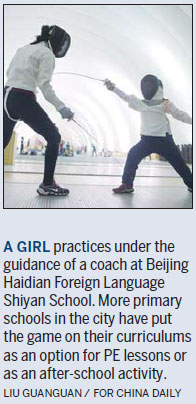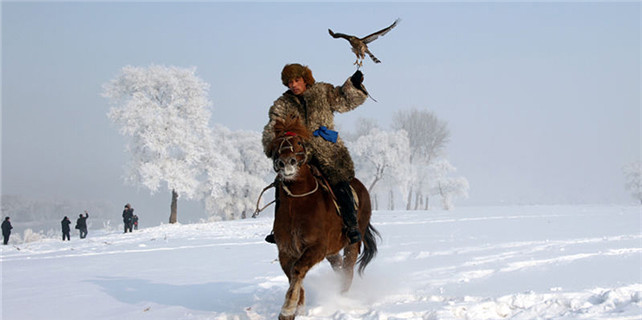New generation of golfers emerges
Young enthusiasts, encouraged by their parents, are swelling the ranks as China looks to become a major player in global game
When Zhang Lingxin was studying at Hunan Golf and Tourism College in Changde, in Central China's Hunan province, his coach gave him a tip that changed his game: focus on the ball and aim long, but at the target, or the hole, not the ball.
However, last year, when the 23-year-old finished school and started looking for a job, he did the exact opposite.
|
|
Having spent a few months working as a caddie at a golf club in Guangzhou in South China's Guangdong province, carrying clubs and collecting balls for some of the country's richest businessmen, Zhang decided to change the focus of his career and aim for a most unlikely group: the youngest golfers.
"Before I applied to the golf college, my parents were concerned that I would not be able to make a living from my major. And I didn't want their fears to come true," says Zhang, a native of Huaihua, about three hours from Changde by train.
His decision to concentrate on teaching juniors came on the back of arguably the most dramatic change China's golf industry has experienced in the three decades since the game was revitalized by business executives from Hong Kong and Macao.
Since late 2013, golf, along with extravagant wining and dining, has been a major casualty of the country's anti-corruption campaign.
China's golf industry last year saw a significant decline for the first time since the 1980s, according to a white paper published in March by the Forward Group, a specialist golf management company based in Shenzhen, Guangdong.
The company estimated that there were approximately 390,000 "core golfers" - defined as those who play at least eight times a year - in China last year, a decline of almost 5 percent from 2014.
More than 100 of the country's 600 or so golf courses have closed, and about 50 percent of those that remained are in debt, the paper said.
Despite the bleak overall picture, one man in Shanghai plans to use his 10-year-old son and the boy's millions of peers to rescue the sport.
"It could be a good opportunity to give golf a facelift in China. It has been wrongly associated with aristocrats and corruption for too long," says Mi Yao, founder of the Yao Shine Golf School, where Zhang is now employed to coach juniors.
Mi is not the first person in China to attempt to make a business out of teaching children golf, but the 36-year-old Shanghai native is definitely the first to join with public primary schools in the city to make the game more accessible, if not free, to children from "non-superrich families", as he puts it.
He has convinced the principals of 11 schools to put the game on their syllabuses as an option for PE lessons or after-school exercise. He estimates that 2,000 students have taken their first swing with a golf club because of his program, which started in September.
Zhao Jinghan, vice-principal of Yangpu Primary School, which began listing golf as a free extracurricular activity this semester, said the move has been welcomed: "The kids are thrilled to try, and parents are more than ready to pay extra for frequent practice sessions to improve their skills."
She noted that there has been a shift in attitude toward sports among the new generation of parents. When they were at school, sports usually was the province of academically poor students who hoped their sporting skills would enable them to earn a living.
Now, though, sports - especially Western sports - are considered a plus to make a resume look better when students apply to schools overseas.
Peng Keng, an event manager at IMG China, the agency that manages junior golf games organized by HSBC, has witnessed rising interest in the game among Chinese parents.
He recalls that when his staff first helped start the HSBC games in 2006, they traveled around the country to find children who could swing a club, but only managed to find 30. However, for the 2016 tournament, the first round of which kicked off in Guangzhou in March, they had to raise the threshold for participants.
"Some parents pay for air tickets and accommodations (so their children) can participate in every game," he says. Peng estimates that around 100 games are tailored for junior golfers in China, but that still doesn't meet the surging demand.
A report by Dazheng Golf, a golf services and marketing agency that's part of Beijing Dazheng Chengping Culture Communication Co, shows that by the end of last year there were 3,381 registered junior golfers in China.
The number of junior golfers, especially those younger than 12, is rising by 30 to 40 every year. But there is a high dropout rate among teens ages 15 to 17, who are unable to combine golf with their increasingly heavy academic workload, Peng says.
"The biggest challenge in growing golf is the limited number of courses that offer affordable access to players," he says.
Government intervention and a nationwide passion to get out of the house for daily exercise are believed to be major drivers of the growth of affordable golf and other sports.
In October 2014, the State Council issued a guideline to accelerate the development of the domestic sports industry. The move aims to capitalize on the sector's economic potential, which is projected to reach 5 trillion yuan ($762 billion; 684 billion euros) by 2025 and account for about 1 percent of China's GDP, up from the current 0.6 percent.
xujunqian@chinadaily.com.cn
Western sportsscoring points

Rugby
This popular team game - especially the sevens version - is a growing presence in Chinese schools, where parents regard it as a positive way of developing children's physical and mental toughness.
A number of amateur junior clubs have been founded in at least eight cities, including Beijing, Shanghai and Qingdao in Shandong province, where children practice sevens and touch rugby (which involves minimal physical contact).
The National University Rugby Sevens Championship has been played annually since 2013, with last year's event attracting 12 male and eight female college teams from across the country.
Fencing
Inspired by the gold-winning feats of Chinese fencers at recent Olympics, the sport is gaining a foothold in schools, despite its combative nature and the expensive equipment required.
The Primary and Secondary Schools Fencing Championships have been held in Beijing since 2014, and last year's event attracted about 1,000 participants from 30 schools. Some local education authorities, such as those in Jiangsu province, have worked with commercial fencing clubs to provide on-campus training for students and PE teachers.
Sailing
As the location of the sailing events at the 2008 Olympic Games, the coastal city of Qingdao introduced the sport
as an extracurricular PE program in local schools in 2006 to raise public awareness. More than 20,000 primary and secondary students have now received on-campus and offshore training in the sport's history, equipment, and the physical and technical requirements.























